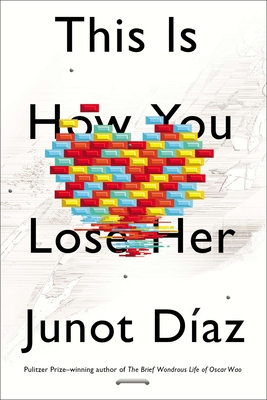If you're like me, you are always searching for new authors
to latch onto, especially if many of your old stand-bys are growing, well,
older or passing away. I first
confronted this after college when my favorite author, Shusaku Endo died in
1996. While you may not be familiar with
his work, rumor had it that one of the cut scenes from the last season of Lost
made reference to his last novel, Deep River, which was centered around
travelers on a spiritual quest (sound familiar?). Also, his novel, Silence, was supposed to be
made into a movie by Martin Scorsese, but that still has yet to come to
fruition. But, I digress.
I don't know how to review This is How You Lose Her with
sounding negative. If you haven't read
Junot Diaz, I highly recommend that you do.
A caveat though because I have hand sold a lot of books to customers
over the years or recommended books to patrons who come into my library. One of the most critical skills to being
successful at this is listening, which is why there remains a huge gap between
what a real person can share versus what is generated by a computerized algorithm. What authors do they like? Are they open to new ideas? Do they like who they like and don't want to
stray too far from that? As conversations
occur about their daily lives, one gets a sense of what books will connect with
them. When I read The Brief andWondrous Life of Oscar Wao, it was amazing.
I had already read Junot Diaz' first collection of short stories, Drown,
and I am always amazed when an author can write in both forms with such
skill. That said, the book group at my
library, which tended to be more traditional, had told me they were looking for a book to
spice things up. I had just the book for
them: Oscar Wao.
I know that I haven't told you a thing about Diaz' new
collection which deals with the Dominican immigrant experience in America with
no filter. It is sometimes jarring and
uncomfortable, but that is what makes it so effective, the honesty of the
writer who has found his voice. Each
story is about love lost and only occasionally found due to infidelity or the
characters' inabilities to cope with the tragedies of their lives.
This book is up for the National Book Award this year, but it was my
least favorite of the three he has written.
In fairness, this is like me saying, "well, I really liked
Morrison's Jazz and Song of Solomon, but The Bluest Eye...was just so-so." One affect he employs in several stories is
an O. Henryesque twist that turns the entire story inside out. The story can be progressing toward a gut
wrenching ending and suddenly there is this glimmer of hope or the reader may
think everything is going to work out and then, nope, not so much.
Diaz is not for the faint of heart due to the content and
language he employs, much like Palahniuk, although Palahniuk deals much more
with the absurd whereas Diaz is deeply entrenched in the reality of his
characters' lives. What's my point? Open your mind to Junot Diaz.
--Edward


No comments:
Post a Comment